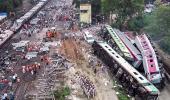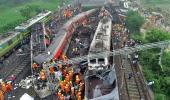The process for the cremation of 28 unclaimed bodies of people who were killed in the triple train accident in Odisha's Balasore district four months ago was completed by the Bhubaneswar Municipal Corporation (BMC) on Wednesday, officials said.

The process of cremation of unidentified bodies of the train accident which began on Tuesday evening was completed at about 8 am on Wednesday, BMC Mayor Sulochana Das said.
Das said women volunteers actively participated in the funeral.
"Women volunteers notwithstanding any stigma came forward and lit funeral pyres of the bodies. They even do not know the religion of the deceased persons or whether the bodies were males or females," the Mayor said.
The bodies had turned ice in the container where they were preserved for above four months, she said, adding that all the bodies were cremated at the Bharatpur crematorium by BMC.
Madhusmita Prusty (37), Smita Mohanty (53) and Swagatika Rao (34) who cremated the first three bodies, said: "We came forward on our own to do this sacred ritual for the unidentified bodies. They might be our relation in some previous lives."
Rao said that the bodies were beyond recognition and one cannot identify whether they were males or females.
"Above all, they were human beings and their last rites are done with dignity," she said.
An NGO was engaged to conduct the 'Mukhagni' (lighting the funeral pyre) and collect the bone pieces for immersion in water bodies.
The unidentified bodies were kept in All India Institute of Medical Sciences, Bhubaneswar in a container after the triple train accident on June 2 at Baganaga Bazaar in Balasore district.
The AIIMS Bhubaneswar authorities handed over the bodies to BMC in the presence of officials of the CBI, which is probing the train tragedy which claimed 297 lives.
"All the unclaimed bodies have been cremated according to the state government, central government and NHRC guidelines," a senior BMC official said, adding that the entire process of handing over bodies to the funeral has been videographed.
The official said that the DNA of the bodies was preserved for investigation as well as for legal issues if any.
"Though nobody came to claim the 28 bodies in the four months, anyone may make any claim later. Therefore, keeping in view the legal issues, we have preserved the DNA," said Prof Pravas Tripathy, head of the Anatomy department of AIIMS Bhubaneswar.
The AIIMS Bhubaneswar in a release said the hospital had received 123 bodies on the night of June 4 and another 39 from Capital Hospital and other private health facilities. Among them, 81 bodies were identified by the relatives. The identity of another 53 was confirmed by DNA profiling and handed over to the families.
"The remaining 28 bodies were handed over to BMC for final cremation on October 10," AIIMS Bhubaneswar said.
The CBI, which is investigating the accident, had recently urged the Khurda administration for the cremation of the bodies. An intimation was then sent to the BMC to prepare a standard operating procedure for the same and also AIIMS, where the bodies were preserved.
The Shalimar-Chennai Central Coromandel Express, Bengaluru-Howrah Super Fast Express and a goods train were involved in the accident on June 2 near the Bahanaga Bazar station.










 © 2025
© 2025